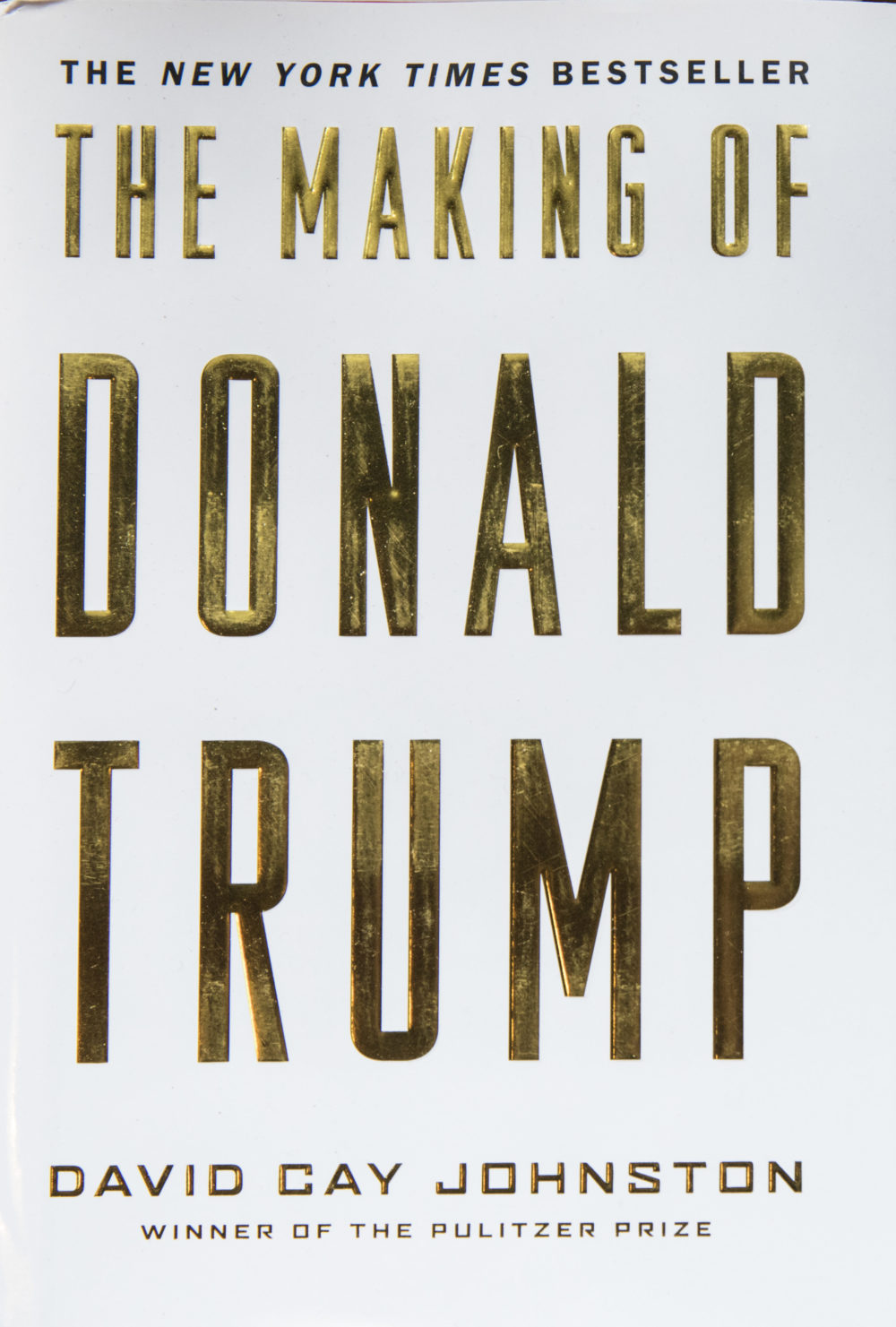This Indie Publisher Is Throwing the Books at Trump
Brooklyn's Melville House, an activist press, is having a heyday as a voice of the resistance
Dennis Johnson, the co-owner of Melville House, backed by a display of his publishing house's titles at the company's offices and bookstore in Dumbo (All photos by Robert Nickelsberg)
There’s an indie publishing house on a quiet, cobblestone street in Dumbo with both its small fists raised to the sky in protest, and they’re not coming down.
Melville House Publishing was born on 9/11, came of age during the Bush years, found respectable success, and emerged in the last several months with a sustained, full-throated howl of protest against the Trump Administration.
“I feel like I’ve prepared my whole life for this moment,” co-founder Dennis Johnson said in an interview with The Bridge. “Never have I felt that what I was doing was so meaningful. In terms of publishing, as an activist press, this moment really is our sweet spot.”
This is borne out by Johnson’s recent acquisitions, which include titles like Our Four Years, about pushing back in Trump’s America, and The Antifascist Handbook, which would seem to speak for itself.

A sample of Melville House’s current nonfiction titles at the company’s bookstore
Johnson is fairly tall and has an almost aristocratic manner that’s complicated by a gold earring in his left ear. We were seated in the office he shares with his wife, Valerie Merians, who co-founded and runs the company with him. The office is built in a mezzanine-level loft and looks out onto the rest of the staff and, closer to the entrance, the bookstore.
An Unlikely Route to Publisher
Johnson did not come up through the publishing industry. Or the business world. He was a poet, writer and book blogger, and Merians a sculptor. They lived in Hoboken, N.J., and Johnson was working on a blog post when the planes hit the towers just across the river. In the days that followed, he published poems and recollections of the event on his blog, MobyLives. The couple ended up collecting the works and publishing them in a book, Poetry After 9/11: An Anthology of New York Poets. The book ended up doing surprisingly well, and kicked off the company.
“I think it was important we weren’t business people,” Johnson explained. “We came into this as artists and our attitude was that of an artist. If you’re a painter you don’t sit there and run out of paint and say ‘Am I over budget on this?’ You go out and buy a tube of paint and paint it till its finished.”
Melville House’s current catalogue includes titles by one of the world’s leading anarchist intellectuals, David Graeber, author of The Utopia of Rules, about how bureaucracy controls our lives. In January, Melville House released What We Do Now: Standing Up For Your Values in Trump’s America, a collection of essays edited by Johnson and Merians. The book, swiftly published before the inauguration, includes writings from some of the standard bearers of America’s left, including Gloria Steinem, Bernie Sanders, Paul Krugman, Katrina vanden Heuvel, and George Saunders.
Melville ranges well beyond politics, publishing novels by contemporary writers, a series of novellas by writers of the Western canon, and a series of final interviews with some of the 20th century’s late, great thinkers.

Johnston’s book, pulled together in just a few months as Trump headed toward election, became a bestseller
But Trump is the whale that tantalizes Johnson. This summer Melville had a hit with The Making of Donald Trump, a biography by David Cay Johnston, a Pulitzer Prize-winning journalist. Johnston had been covering Trump since he was first assigned a profile of the tycoon in Atlantic City in 1988, while writing for the Philadelphia Inquirer. Melville’s Johnson approached him last June with a big request: the publisher wanted the book done in four weeks, so he could get it out to the public before the election.
In a process called “crashing” the book, the Melville team worked around the clock. Johnston collected all his writings on Trump and organized them. After he finished a chapter, he would send it to Melville House, whose editor would work on it and send it over to Johnson, who would read it and send it to Melville House’s lawyer. By this time, Johnston would be well into the next chapter, and so on.
“Our attorney used to be the corporate counsel for Penguin and he always tells us ‘No, don’t do that.’ I thought he was gonna say don’t do this, but in fact he said ‘Do this book no matter what. If he sues you, every attorney in Manhattan will offer to work pro bono,’” Johnson recalled.
Published on schedule on Aug. 2, book reached the New York Times bestseller list and beat other Trump books out that summer in sales. If Johnston’s name seems familiar, it may be due to his recent appearance on the Rachel Maddow show on MSNBC. Johnston is the journalist who came up with the first two pages of Trump’s 1040 tax filing from 2005 and was Maddow’s guest on the show that became a national media event when they were released to the public.
A Speedy Publishing Strategy
The Trump book is not the only one Melville House has crashed. The process is coming into fashion with Johnson, who sees it as a way to beat the bigger, slower publishing houses to a popular subject. On Dec. 9, 2014, a Tuesday, the U.S. government released a version of the Senate Intelligence Committee Report on Torture. Heavily redacted, the report was really a 525-page synopsis of the orginal 6,000-plus pages. “I saw they were trying to bury this fucking thing and I was going to publish it!” as Johnson said.
It’s not unusual for book publishers to print copies of government reports. In 2004, W. W. Norton & Co. had a smash hit with the publication the 9/11 Commission Report, selling more than 350,000 copies in the first two weeks. The torture report was not like the 9/11 Commission Report, which had been given to Norton by the government, formatted, and ready to publish. The torture report was released into the public domain, redacted in a PDF format that was unsearchable and hard to read.
Johnson and his team had to retype the whole thing into a Microsoft Word format. “It turned into an amazing effort,” he recalls. “We were working all night, it was winter and the heat had kicked off at 6 o’clock. We started live tweeting what we were doing and got a couple volunteers. People from Farrar Straus & Giroux came over, people from Harper’s came over, people sent us food, and then The New Yorker did an incredible piece on us.”

Besides contemporary political titles, Melville publishes a variety of fiction, memoirs and other work
There is no letup on the horizon for Melville House, as Johnson’s recent acquisitions show. Besides Onnesha Roychoudhuri’s Our Four Years and The Antifascist Handbook, Melville has signed Ars Technica senior business editor Cyrus Farivar to write Habeas Data, a critical look at how 50 years of American privacy law is inadequate for the future of surveillance.
Recently The Washington Post adopted a new motto that stands as a rallying cry for reality-based journalism: “Democracy Dies in Darkness.” At Melville House, they already have one of their own: “That Whale Is Out There, Man!”













